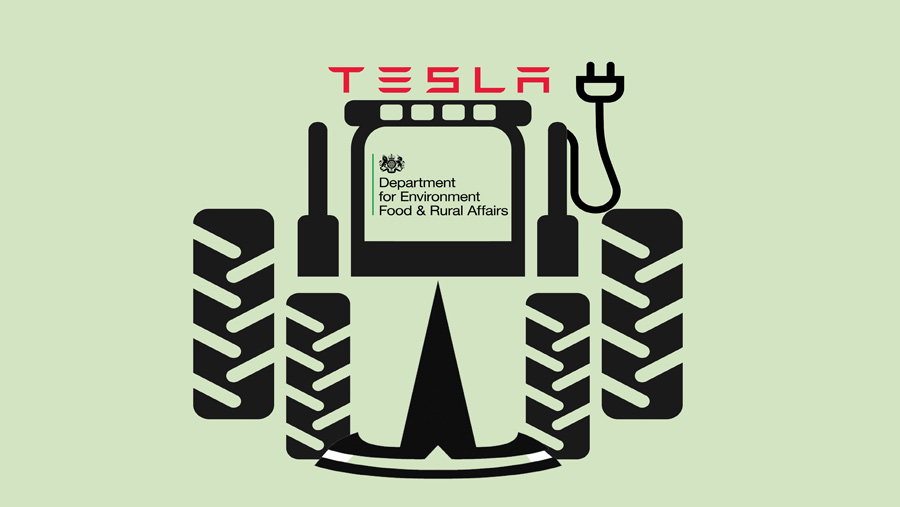Defra and Tesla join forces to develop electric tractors
 © MAG/Heather Curtis
© MAG/Heather Curtis US-based Tesla, the electric vehicle and clean energy company, has formed a joint venture with Defra to develop electric tractors aimed at saving farmers money and the environment.
Defra secretary George Eustice has pledged an initial £500,000 that was not claimed by farmers in the recent Countryside Productivity Small Grant scheme to kickstart the project, which will see Tesla e-tractors built in UK factories.
“I’m not Eustice’s biggest fan, but I think this is genius. I’m fed up paying exorbitant prices for red diesel, but by having solar PV panels on farm, I believe this is the solution farmers have been waiting for,” said Merseyside arable farmer Olly Harrison.
See also: Defra’s new ELM policy ‘leaves farmers in the dark’ say concerned MPs
“This deal means eventually I can charge my tractors and telehandlers and not have to sell my electricity to the grid for a much lower rate.”
The government has chosen Tesla because it has access to the best batteries on the market and its cars have the highest range.
It is hoped prototype testing of the “Desla” e-tractor will start in early 2023, with full production of the e-tractor range starting in late 2024. However, this depends on whether the global semiconductor chip shortage comes to an end.
If there is not enough farmer uptake of e-tractors, Defra will consider the removal of the lower-rebated red diesel fuel rate on a sliding scale from 2027, similar to the phased removal of basic payments.
John Deere expertise
It is believed US farm machinery giant John Deere, which has launched electric tractors in recent years, has offered to share its expertise to accelerate the production of all-electric tractor prototypes for zero-emission agriculture by 2050.
Defra special advisers have earmarked the mothballed CF Fertilisers factory in Cheshire to act as a Tesla gigafactory to supply enough batteries to support projected demand for electric tractors.
The gas pipe supplying CF Fertilisers is ideal to provide enough power for the gigafactory to produce the batteries.
Meanwhile, the former TVR factory site, in Blackpool, is being eyed as a possible site to build the e-tractors.
Hydrolysis on farm
Longer term, part of the deal could also see former vehicle batteries used in solar-powered hydrolysis plants on farm to produce hydrogen from rainwater, which could be used to make fertiliser or power the hydrogen vehicles of the future.
A Defra source said: “Anglo-American partnerships are a lot easier to set up since Brexit and we have been freed from the shackles of EU laws imposed by unelected bureaucrats in Brussels.
“The UK is keen to drive forward an independent trade policy by striking trade deals with new friends and old allies, including the US.”
One farming industry lobbyist said: “Any move to cut our on-farm emissions is to be welcomed, and what better day to launch such a project than 1 April.”
